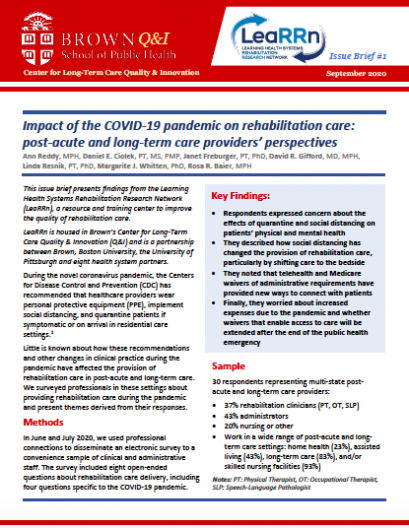Survey findings afford an early glimpse of dramatic changes in the delivery of rehabilitation care in post-acute and long-term care during the COVID-19 pandemic—particularly in terms of therapy shifting to in-room and bedside care and in terms of the rapid increase in telehealth.
These findings are published in an Issue Brief presenting results from a Learning Health System Rehabilitation Research Network (LeaRRn) survey of clinical and administrative professionals. Thirty providers working in post-acute and long-term care settings responded, and the issue brief summarizes responses regarding how the pandemic has affected the provision of rehabilitation care.
In addition to discussing how in-room therapy and telehealth have increased, respondents expressed concern about the effects of quarantine and social distancing on patients’ physical and mental health. They also worried about the business implications of increased expenses and reduced revenues: there have been no changes in reimbursement to compensate for the shift from group therapy to one-on-one rehabilitation or the time and expense associated with use of telehealth electronic platforms, personal protective equipment, and other supplies. Finally, respondents wondered whether or not waivers that enable access to care will be extended after the end of the public health emergency.
LeaRRn is a resource and training center to improve the quality of rehabilitation care, anchored on the idea that research should involve collaboration between researchers and health systems. These findings emphasize the continued importance of eliciting stakeholder perspectives to ensure that such research is grounded in and responsive to real-world considerations.
LEARRN ISSUE BRIEF #1: IMPACT ON REHABILITATION CARE (SEPTEMBER 2020)

